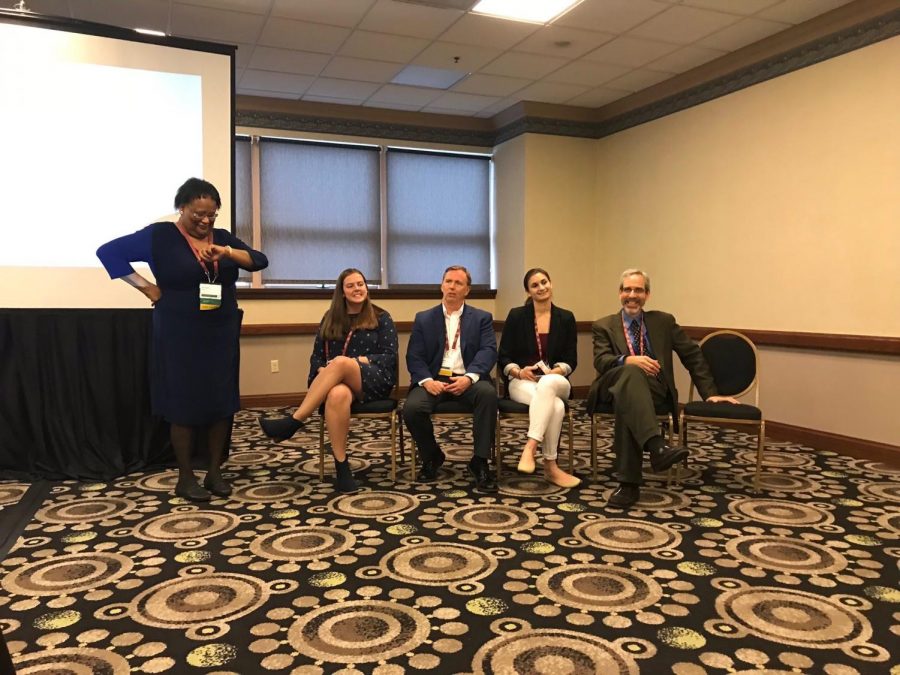Sexual Misconduct On College Campuses
From Left, Dr. Vivian Martin, Bailey Vandiver, Frank Lomonte, Ruth Bruno and Matthew Kauffman.
November 2, 2018
For colleges across the United States, the issue of sexual misconduct has become a reality too many students are familiar with. In an effort to open up the conversation, Central Connecticut hosted a Sexual Misconduct on College Campuses panel at the College Media Association Conference in Louisville, Kentucky.
“What we don’t immediately think about are professors as sexual [predators] towards students and this has been coming up around the country. Some brave newspapers are trying to tackle this,” Central’s Journalism Department Chair Dr. Vivian Martin said.
Last April, The Recorder investigated multiple accusations against Theater Professor Joshua Perlstein for sexual misconduct. CCSU proved it was not alone in tackling such an issue.
Editor-in-Chief Bailey Vandiver of the Kentucky Kernel knew sexual assault on colleges campuses too well from the beginning of her newspaper career.
The University of Kentucky (UK), which Vandiver is enrolled in, is currently suing the school’s newspaper. They now have three lawsuits against them.
James Harwood, an entomology professor at UK, was investigated for alleged sexual harassment. The professor reached a resignation agreement with the college that allowed him to still have pay benefits as well as no repercussions put on his record.
In 2016, two of Harwood’s victims tipped off the Kernel. With these tips and a few documents from UK, the Kernel released the first story of the professor’s resignation agreement.
“The Kernel filed an open records request for all of the documents pertaining to the sexual misconduct investigation. The two victims who gave the Kernel the tip didn’t feel comfortable handing in official documents that they had received from UK at that time, so the Kernel said, ‘Okay, we will file an open records request and do it that way,'” Vandiver said.
This approach did not work. UK denied the request and would not hand over any documents to the Kernel. The Kernel then appealed this action and UK once again refused and said that they were going to sue, which is ultimately how one appeals a decision.
The Kernel ended up in two other lawsuits by filing more requests for documents from other colleges to see if sexual assault was also happening on other grounds in the state.
Frank Lomonte, Director of the Brechner Center for Freedom of Information, spoke to the audience about legal documents and how to get a hold of the,. He urged the room that when it comes to the Freedom of Information Act, or FOIA, that grants the public access to information possessed by the government when turned down, the answer does not always have to be no.
The Recorder, however, had to use other means to report on the sexual misconduct of Perlstein.
CCSU alumna Ruth Bruno, the former Managing Editor of The Recorder who broke the Perlstein story, and Harford Courant Investigative Reporter Matthew Kauffman decided FOIA was not a route that should be taken. Kauffman decided the best way for Bruno to get the documents she needed to expose Perlstein was going to take longer; she was going to have to go from victim to victim.
Bruno originally received tips from students and professors saying that Perlstein was “creepy,” and she decided to look further into it.
One of Perlstein’s victims reported sexual misconduct against him and Central’s response was for the professor to just not go near the student anymore. Sexual misconduct allegations had been reported two decades ago, but nothing had been done.
Bruno, when trying to piece the story together, could not obtain access to any personnel files, which led to the story taking six months to complete. Bruno had to find victims over social media and make them feel comfortable sharing their story.
“When you’re covering sexual assault, these are people who have already lost control of a situation and you don’t want to place them in that situation again. I think it’s okay to tell people you believe them. You can explain that you have to have the documents to prove to other people that this happened, but you can still be a person,” Bruno said.
After Bruno’s story in The Recorder was published, things changed overnight.
“The next day, the professor was placed on paid administrative leave. An outside investigation was launched into what happened and what occurred, and Central’s 90-day [Office of Diversity and Equity] reporting policy was placed under review and is no longer in place,” Bruno stated.
College newspapers face roadblocks when covering sexual misconduct and sexual assault stories on campuses. Some may take years, others six months, but these stories continue to be reported in the hopes for a better atmosphere, as well as getting justice for students and faculty.






